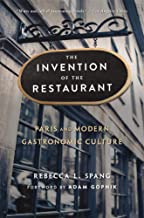Additional information
| Shipping Time | 10 To 15 Days |
|---|
Original price was: ₹1,870.00.₹1,590.00Current price is: ₹1,590.00.
Spang has written an ambitious, thought-changing book. Until now, most restaurant history was pop history, filled with canned ‘Eureka!’ moments and arch legend-making… Spang’s book is an example of the new ‘niche’ history, and, like the best of such books, it is rich in weird data, unsung heroes, and bizarre true stories about the making of familiar things.–Adam Gopnik “New Yorker ”
[A] pleasingly spiced history of the restaurant… How has [the] restaurant ritual come to be? And why does it have this form? Such questions are now familiar in works of cultural and social history…[but] Spang adds to the genre without falling prey to its jargon.–Edward Rothstein “New York Times ”
This prize-winning academic historical study is a lively, engrossing, authoritative account of how the restaurant as we know it developed… Rebecca Spang is consistently perceptive about the semiotics of her theme, and as generous in her helpings of historical detail as any glutton could wish.–The Times
No more fables about ancien régime chefs, whose aristo patrons had been guillotined or exiled in the French Revolution…an end to those anecdotes about their invention of dishes broiled on a breastplate on some Napoleonic battlefield. Because Spang reveals the restaurant’s first true author: Mathurin Roze de Chantoiseau, ‘friend of all the world, ‘ an entrepreneur who edited an annual business directory in which he recommended himself as the ‘king’s restauranteur’ and founder of the first ‘house of health.’–Vera Rule “The Guardian ”
Rebecca Spang explodes a culinary myth that has lasted nearly two hundred years.–Margaret Visser”London Review of Books” (11/30/2000)
Almost every page of this decidedly scholarly though highly readable book gave me something to think about: the origins of restaurant reviewing in the early years of the 19th century, the way in which other Europeans came to identify the restaurant with the essence of French-ness itself, or the fact that in French one word–carte–does double duty for both menu and map.–Michael Gora “Boston Sunday Globe ”
The perfect book for a time of year that celebrates, among other things, food. Historian Rebecca Spang begins with an inspired question: Why are there restaurants? To answer this, she takes the reader back a couple of centuries to France, when a restaurant was actually a thing to eat and not a place to go. Her well-researched, compelling book deservedly won several awards.– (12/22/2001)
Readers hungry for mouth-watering accounts of sumptuous meals or paeans to the glories of French cuisine will not find them here. Spang’s focus is on the restaurant as an institution, and her history pretty much ends in the mid-19th century. Spang is far more interested in viewing restaurants in a wider social, political, and historical context. Her book is well…argued, dryly witty, and full of fascinating details.–Merle Rubin “Los Angeles Times ”
Spang writes entertainingly, with a keen sense of humor and with no great reverence for her subject. It is a refreshing contrast to much of the overwritten adulation of restaurants that passes for criticism today.–Roger Harris “Newark Star-Ledger ”
The title of Rebecca L. Spang’s scholarly yet highly accessible social history, The Invention of the Restaurant, causes a small jolt of surprise. For people who eat out so often that boiling a pot of spaghetti at home is a special occasion, a world without restaurants is hard to imagine. We realize, at some level, that they have not always been here, but few of us could say who invented them, or when… Much of this information is ignored in the standard food histories, and Spang’s excavation of it makes for interesting reading, particularly because the French Revolution and its aftermath would change restaurants almost beyond recognition, into something very like the places where we go out to eat today.–Pete Wells “Salon “
| Shipping Time | 10 To 15 Days |
|---|
Only logged in customers who have purchased this product may leave a review.

Reviews
There are no reviews yet.